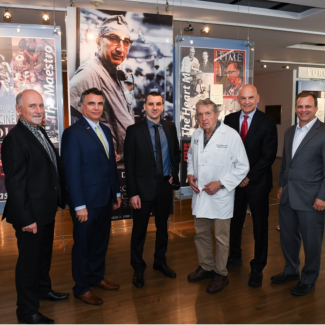
Dr. Sardiello receives The 2019 Michael E. DeBakey M.D. Awards for Excellence in Research
Dr. Marco Sardiello, assistant professor of molecular and human genetics at Baylor and member of the Jan and Dan Duncan Neurological Research Institute at Texas Children’s Hospital, is one of the five researchers to receive the 2019 Michael E. DeBakey M.D. Awards for Excellence in Research. The award ceremony honored five Baylor College of Medicine faculty members for their excellence in published scientific contributions to clinical or basic science research over the past three years. The five awardees are representative of the quality and scope of research at Baylor College and Texas Children's. Their work has made significant contributions to their fields of study and to improving human health.
The Sardiello lab has quickly become a leader in the field of lysosome-autophagy biology that studies the waste disposal system of the cell and how its malfunction leads to the accumulation of cellular waste and lysosomal storage disorders, including Batten disease and other neurodegenerative conditions. Dr. Sardiello discovered that master transcription factor EB (TFEB) stimulates the cell to produce more lysosomes and degrade cellular waste more effectively and that TFEB activity is normally inhibited by Akt-mediated phosphorylation. These finding led to the discovery that small-drug inhibition of Akt promotes TFEB function. When tested in animal models of fatal lysosomal disorders, drug-induce inhibition of AKT ameliorated neuropathology and extended the life span of diseased animals. Published in Nature Communications in 2017, these findings are the foundation of a clinical trial for lysosomal storage diseases that is under development. In 2018, the Sardiello lab identified a novel and unexpected mechanism serving lysosomal biogenesis. CLN8, a protein mutated in Batten disease subtypes, is a cargo receptor that serves ER-to-Golgi trafficking of newly synthesized lysosomal enzymes. CLN8 deficiency results in impaired maturation of lysosomal enzymes, thereby causing lysosomal dysfunction. Published in Nature Cell Biology, this shows that the pathogenesis of Batten disease is rooted in impaired lysosome biogenesis, thus solving a long-lasting biomedical mystery and opening new therapeutic opportunities. In 2019, the Sardiello lab set the foundation for a better understanding and treatment of tuberous sclerosis, a disease characterized by the formation of tumors in multiple organs and glycogen accumulation. mTORC1, a protein complex that regulates cell metabolism, has long been considered the major driving force behind tuberous sclerosis. But in their report published in PNAS, Sardiello et al show that a second mechanism independent of mTORC1 also is involved. Defects in lysosome formation and in the digestion of cellular materials lead to glycogen accumulation. This could guide novel approaches to treat the disease in patients who partially respond to the treatments targeting mTORC1.